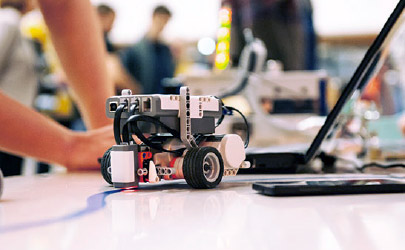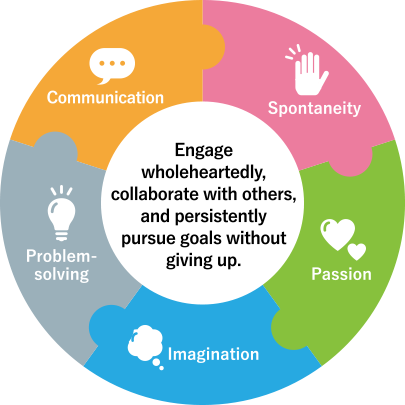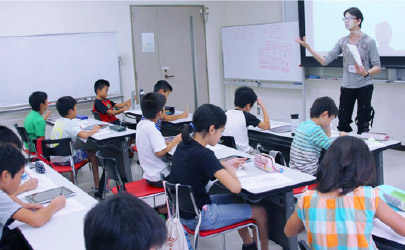ICT education
Nurturing the next generation of ICT professionals.
There is an administrative view that emphasizes the need for talent development due to projected shortages of STEM professionals to address the Fourth Industrial Revolution and globalization.
The Ministry of Education, Culture, Sports, Science and Technology (MEXT) announced new curriculum guidelines for elementary schools, middle schools, and high schools in March 2017 and March 2018. These guidelines aim to realize school education that cultivates children's abilities to adapt to technological advancements and societal changes, ensuring their skills remain applicable even as technology and the times evolve. The guidelines focus on the following key points:
The Ministry of Education, Culture, Sports, Science and Technology (MEXT) announced new curriculum guidelines for elementary schools, middle schools, and high schools in March 2017 and March 2018. These guidelines aim to realize school education that cultivates children's abilities to adapt to technological advancements and societal changes, ensuring their skills remain applicable even as technology and the times evolve. The guidelines focus on the following key points:
- Positioning information literacy as a fundamental quality and ability for learning, on par with language proficiency.
- Considering the establishment of a school's ICT infrastructure and enhancing learning activities utilizing ICT.
Kicks Hamamatsu: Programming School for Children
We have opened the children's programming school "Kicks Hamamatsu Nishi Branch" at 4307-2 Okubo-cho, Nishi-ku, Hamamatsu City. It is located within the SANEI HYTECHS Corporation's Engineering Development Center. Kicks, a pioneer in STEM education, has been captivating children with robot construction and programming since its establishment in 2003. We utilize LEGO® blocks as our educational kits, fostering children's learning through play.

We nurture the abilities of children to thrive and excel in the world.
The Fourth Industrial Revolution and globalization have brought about significant changes in society and daily life.
To cultivate children who can unleash their own potential and thrive amidst unpredictable changes, we, through Kicks/Crefus robotics education, foster the following qualities in children:
To cultivate children who can unleash their own potential and thrive amidst unpredictable changes, we, through Kicks/Crefus robotics education, foster the following qualities in children:
- Initiative: The ability to proactively engage and interact with others.
- Passion: The capacity to discover and pursue interests with enthusiasm and dedication.
- Imagination: The power to generate new ideas and concepts with creativity.
- Problem-solving: The skill to approach new challenges logically and persistently without giving up.
- Communication: The ability to express one's thoughts, empathize with others' perspectives, and collaborate effectively.
Kicks/Crefus
What we are passionately striving for is to deliver the power of envisioning the best future for each and every child.
Kicks/Crefus, a pioneer in STEM education, has been captivating children with robot construction and programming since its establishment in 2003.
STEM education is a term that encompasses the fields of Science, Technology, Engineering, and Mathematics. In Japanese education, starting from the academic year 2020, programming lessons have become compulsory in elementary schools. The objective is to encourage students to "learn on their own and understand independently."
Amidst the increasing number of robotics and programming workshops available today, our commitment as industry pioneers remains unwavering. We want to empower children with the ability to embrace various technological advancements, such as artificial intelligence (AI), and the societal changes that lie ahead, enabling them to lead fulfilling lives. That is why the program we have passionately built ourselves is Kicks/Crefus.
STEM education is a term that encompasses the fields of Science, Technology, Engineering, and Mathematics. In Japanese education, starting from the academic year 2020, programming lessons have become compulsory in elementary schools. The objective is to encourage students to "learn on their own and understand independently."
Amidst the increasing number of robotics and programming workshops available today, our commitment as industry pioneers remains unwavering. We want to empower children with the ability to embrace various technological advancements, such as artificial intelligence (AI), and the societal changes that lie ahead, enabling them to lead fulfilling lives. That is why the program we have passionately built ourselves is Kicks/Crefus.

When you enjoy something, you can become completely absorbed in it.
However, we will provide an environment where both parents and children can tangibly experience the best future that lies beyond their enthusiasm. From a sense of personal growth to a sense of awareness of the world, we believe in creating an environment where children can feel excited about their future, unlike traditional cram schools or extracurricular activities.
With Kicks/Crefus, we can deliver a world that expands beyond their passions.
With Kicks/Crefus, we can deliver a world that expands beyond their passions.
Develop the "power" to think logically towards achieving your goals.
From the 2020 academic year, programming education will become mandatory in elementary schools. The purpose of programming education is not to cultivate specialists. It is about acquiring the "power" of "computational thinking," which involves thinking logically towards achieving goals and being able to apply it to various subjects and daily life. This becomes the "power" for children to seize a future in which they can thrive in an AI-driven society with their own hands. However, it is not easy for children to acquire this "power." That's where "teaching materials" that children can understand and a "learning system" that guides their learning become crucial. At Kicks, by learning with tangible "teaching materials = robots" that you can see and touch, and through a learning system packed with expertise accumulated over many years, you will be able to develop the "power" to think logically towards achieving your goals more effectively.
Hamamatsu ITKids Project
Providing educational content to the 'Hamamatsu ITKids Project'. Contributing to the nurturing of future IT professionals.

Hamamatsu City, aspiring to be a combination of an 'Academic City' and an 'IT City,' is hosting the 'Hamamatsu ITKids Project,' an experiential and practical extracurricular IT course. The goal is to nurture talents who will contribute to the local industries and shape the city's future. This program is open to elementary school students residing in Hamamatsu.
We are utilizing our technology in software development, including the development of applications for smartphones, tablets, and more, to create applications for the tablet PCs used in the IT Kids Project's educational content. Additionally, we offer a portion of the lessons using these applications, particularly in the field of IT mathematics. In our local community of Hamamatsu, we will continue our efforts in community engagement to nurture many future 'engineers' and contribute to the growth of the region.
*For more details about the Hamamatsu ITKids Project, please visit our official website.
We are utilizing our technology in software development, including the development of applications for smartphones, tablets, and more, to create applications for the tablet PCs used in the IT Kids Project's educational content. Additionally, we offer a portion of the lessons using these applications, particularly in the field of IT mathematics. In our local community of Hamamatsu, we will continue our efforts in community engagement to nurture many future 'engineers' and contribute to the growth of the region.
*For more details about the Hamamatsu ITKids Project, please visit our official website.
![[Image]SANEI HYTECHS](/en/shared/img/logo_w.png)
